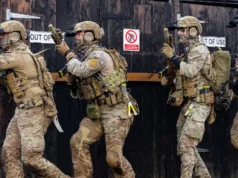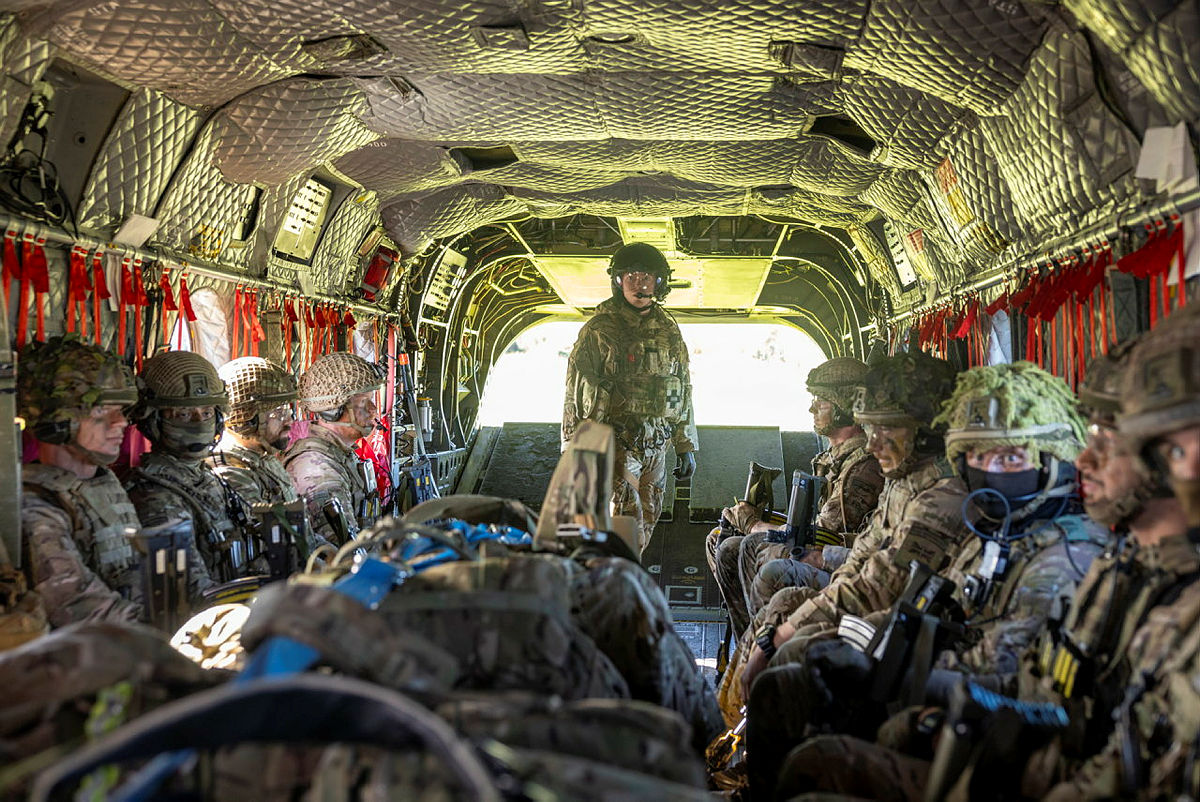The Armed Forces Continuous Attitude Survey (AFCAS) 2024 has highlighted significant concerns among Regular Armed Forces personnel.
It revealed that less than a quarter (23%) of respondents are planning to leave the service, citing dissatisfaction with pay and low morale as primary reasons.
The survey indicates that 23% of personnel plan to leave the services, which includes 6% intending to leave as soon as they can and 3% who have already submitted their notice to leave.
In contrast, six in ten personnel plan to stay in the services in 2024. This overall proportion is consistent with the last two years but remains below the peak level of 66% reported in 2021.
Additionally, 16% of personnel remain uncertain about their future plans, a figure that has been unchanged since 2011.
Declining Morale
The proportion of personnel rating their service morale as low has increased for the third consecutive year, rising from 42% in 2021 to 58% in 2024. Only one in ten (10%) personnel rate their service morale as high, indicating widespread dissatisfaction within the ranks.
Job Satisfaction and Pay
Job satisfaction remains relatively stable, with 57% of personnel expressing satisfaction with their jobs. However, satisfaction with basic pay has seen a significant decline, falling sharply between 2021 and 2023.
This year, satisfaction is stable at 32%, but it remains well below the peak level reported in 2010 (52%). Furthermore, overall satisfaction with pension benefits has fallen for the second year in a row, down to 38%, a five percentage point drop since 2022.
Accommodation Issues
The report also highlights ongoing issues with accommodation. Following significant decreases in 2023, satisfaction with responses to requests for, and the quality of maintenance/repair work of Service Family Accommodation (SFA), has improved slightly, aligning with 2022 levels.
Overall Satisfaction with Service Life
In 2021, overall satisfaction with service life rose to 50%. However, satisfaction fell over the next two years, returning to its lowest reported level, in line with 2018 results. This year, satisfaction with service life remains unchanged from last year, at 40%.
Officers consistently rate their satisfaction with service life higher than other ranks, though their satisfaction has fallen for the third consecutive year, down sixteen percentage points since 2021.
Service-Specific Satisfaction
Army personnel are the most satisfied with service life (44%), followed by RAF (37%), then Royal Marines and Royal Navy personnel (33% and 32%, respectively).
Satisfaction among Royal Navy personnel has fallen four percentage points since 2023 to its lowest ever level. Levels of satisfaction among the other services remain relatively stable since last year but are considerably below the recent peaks reported in 2021.
Perceptions of Value and Family Impact
While over a third (35%) of personnel feel valued by their service, a similar proportion (36%) do not feel valued. These proportions are unchanged since last year and remain below the peak level reported in 2021 (41%).
Half of the personnel do not believe that their family benefits from being a service family, although the majority (81%) still agree that their family is supportive of their career in the services.
Engagement and Personal Attachment
The proportions of personnel that feel proud (74%) and feel a strong personal attachment to their service (58%) remain unchanged this year, below the peak levels reported in 2021.
Other aspects of engagement, such as feeling their service inspires personnel to be the best at their job (44%) and motivates them to achieve the service’s objectives (39%), are also unchanged this year, below the peak levels reported in 2021.
Satisfaction with Welfare Support
Levels of satisfaction with welfare support received after returning from deployment remain unchanged this year following decreases in 2023. Just over four in ten (41%) personnel are satisfied with the welfare support they receive, down from 45% in 2022.
Similarly, just over a third (35%) of personnel are satisfied with the welfare support their families receive when they return from deployment, down from 39% in 2022.
Pay and Allowances
Nearly half (49%) of personnel cite the amount of pay as a factor impacting their intentions to leave, remaining unchanged since last year at its highest reported level. A similar trend is seen with allowances, with 34% of personnel indicating that the amount of allowances influences their decision to leave, up 15 percentage points since 2021.
These concerns are reflective of the falls in satisfaction with pay and allowances reported in 2023, likely influenced by factors such as the public sector pay ‘pause’ in 2021-22 and recent rises in inflation and cost of living pressures.
Service Morale as a Factor to Leave
More than four in ten (43%) personnel cite service morale as a factor impacting their intentions to leave, a figure that has returned to the level reported in 2019.
Since 2021, the proportion citing service morale as a factor influencing intentions to leave has increased by 11 percentage points. Service morale is now a top five factor impacting intentions to leave for the first time since 2020.














For RN engineers, CPO & PO etc they can leave and walk into a job that’s 9-5 and have the same wage or more.
So NO Duties/watches/shifts, on call, extra hours, cleaning, armed party, fire fighting party, sea time, etc
if they do any of the above, pay is likely to increase by 10-20K a year (do a lot of them it will be more than that).
So when the MOD say that the pay is comparable to civilian wages they are talking out of their shiny ring piece.
The RN engineers job takes a long while to be good at it, paying low wages is just sheer stupidity, so the experienced staff leave and things just keep getting worse.
Yes but u can’t compare the 2 in the civilian world they do an apprenticeship (if they could get on one) which takes years on next to no money you don’t get a very good pension and good luck with job security
yes you can compare the two ,but that not the point is it?, they have the skills from being in the RN.
the point is after they are trained and have some experience you need to pay more to retain that skill and knowledge. As they don’t people leave for either better work/life balance or more money.
People with the skills and knowledge end up at good companies with healthcare and pensions which are better.
Job security, oooh never been redundencies in the forces have there, oh yes there have lots of them.
All this is FACT based on personal experience.
Wasn’t there a case of members of the army being informed they were being made redundant by test msg in 2010 ?
I don’t know about the Navy but the army (REME) still provide an appreticeship.
“The REME apprenticeship programme is one of the biggest apprenticeship programmes in the UK, with over 2,000 apprentices in training at any one time. The programme offers a range of apprenticeships, including Level 3 and Level 4 apprenticeships in mechanical engineering, electrical engineering, and electronic engineering”.
Have the REME overcome the problem of SATTs doing menial tasks around camp for years at a time whilst awaiting trade courses?
Good question. I left REME in 2009 and have no serving ‘comrades in arms’ – all my oppos are all well over 60-65. I also don’t know how Lyneham has shaped up as a replacement for Arborfield and Bordon in capacity terms. Sorry, got no info on that one.
Terrible if it takes ‘years’ to get loaded onto a trade course.
Should any of this come as a surprise?
With all this very precise information out there year on year can’t the powers that be try to do something about lifting all these percentages even incrementally? Is more inspired leadership, greater opportunities, improved pay and conditions required? I’ve not served in the military so no idea on this but I can only imagine that it is very different from the commercial private sector where maybe there’s a lot more freedom of choice and movement for the individual? I do still think the vast majority of people are grateful for those that serve their country and people and especially during a crisis!
By all accounts the heads of the Services do try, but they are constantly limited by budgets that have shrunk in real terms for years, compounded by ridiculously expensive contracts being agreed with various industry partners. The “perks” have been comprehensively stripped away over the years, and what would have been considered respite posts (jobs away from the front line work) have been handed off to civilian staff, so many people never get a break from high intensity work – leaving them exhausted, barely seeing their families, and ready to give it all up.
Despite all this, the vast majority are still dedicated and willing to serve – it’s high time that loyalty was properly rewarded.
Some skill sets that members of the armed forces have are much in demanded in the civilian market. A friend on mine son is in the RM, at a guess I would say he has been in ten years. I was talking to her last year and she told me he is leaving as he has got job for a firm ( I think it was cyber security) which pays three times as much as he currently earns. Ok, so he would have to pay into a pension etc, but how do you compete with that ?
To be honest that’s not a bad figure..when you look at the nhs it’s around 47% of staff that are looking to leave..with around a 34.5% loss rate over a 3 year period.
Surely theres a trend here?
You can’t in all honesty really say it’s not bad when comparing it another low paid high stress public service job…both need addressing do they not?
Maybe Sunak could instigate a conscription force for the NHS as well…that’d solve two problems with one stone.
People could choose which one they wanted to do.
I’m joking BTW …but hey ‘many a true word’ and all that…
Yes in this case, I’m using the not bad in the “it’s not very good” but could be worse…Im Trying to think back…but in my head I have a figure that you should be aiming for about 10% thinking about leaving in any one year…with about 5% actually leaving as a good steady state for keeping teams well running…if it’s higher that that your not treating your workforce properly…
You also need to look at the demographics of who’s wanting to leave…it’s it’s mainly focused around those closer to retirement that will be ok ( as long as you have trained and recruited the correct numbers)…but when it’s your younger workforce wanting to leave you know your in the shit..and from some of the public sector workforce reports I’ve looked at…it’s all age groups and demographics that are fed up and leaving….it’s one of the problems we now have in the NHS…once I only had to worry about recruitment of the more experienced clinical staff…so it was hard to find senior drs, charge nurses, enhanced and advanced practitioners for the urgent and emergency care system I worked in ..because we did not train enough advanced clinical groups..now I also have the problem that we cannot recruit the junior staff ( staff nurses, junior Drs ) as we cannot get them to train an work in emergency care ( it’s so bad, they simply will not work there or walk away broken after the first year)..which means even if I got the funds to train up more senior clinical staff…I don’t have the numbers of junior staff to move into the training places….it’s even hit our unqualified staff…my system is now shy 50 odd healthcare assistants to work in our EDs and UTCs…because Tesco pay more and you don’t have to deal with dead kids and other horrors every day…
don’t get me on the conscription thing…that last thing any public sector body needs right now is to nursemaid a load of unwilling teenagers who will spend 25 days with you over a year and then be replaced by another group after a year….we cannot find the people hours to provide oversights training and supervision for student nurses, apprentices and junior drs…now we are going to get a load of none paid don’t want to be there teenagers to babysit at weekends ( just to note that’s the time our services are at its lowest level of staffing as well)…
The statistics are skewed by the way that the questions are phrased and the “on a scale of 1-10” answers.
The Civil servants and senior Military can quote numbers but rarely deal with the core issues that regulars and reserves care about. They only seem to tell “the truth” once retired and on a pension that senior NCO’s with 22 or more years experience can only dream of as a salary.
As a former RAF bloke my greatest concern for the current generation is the ever decreasing mass. The armed forces are/were a large family that work and live together. So if a lot of the rooms are empty people start to become disheartened. That breeds discontent. The HMG don’t help as they love to swing the axe at every opportunity. So if your employer doesn’t want you either then what happens next is fairly obvious. Just my own opinion.
I can believe it. When I left as a senior Major in 2009, train drivers and experienced plumbers were on higher pay.
The Conservatives announced today that they plan to bring back National service if they get reelected starting for 18 year olds. There would be a choice for 1 year military service (possibly longer for the individual if there is interest) or provide assistance to the NHS or other national agency.
I for one am in favor of this. I have seen the benefits in my own family of young people getting into service spanning two countries.
‘pay as you dine’ MUST be a factor in there somewhere. It’s disgusting, costly and leads to unhealthy diets.
Take the civvy companies out of the food markets in British bases, and bring back fully run, military kitchens.. That includes doing away with the so called ‘shops’ in camps and establishments. Non-profit NAAFI should be the source